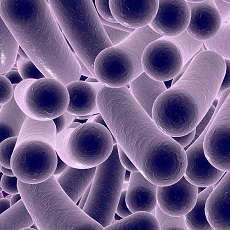
What is C. diff?
C. diff is a bacterium that can cause diarrhea and more serious intestinal conditions such as colitis. You may see it called other names, such as Clostridioides difficile (the new name), Clostridium difficile (an older name), and C. difficile. It causes close to half a million illnesses each year.
What causes C. diff infections?
C. diff bacteria are commonly found in the environment, but people usually only get C. diff infections when they are taking antibiotics. That's because antibiotics not only wipe out bad germs, but they also kill the good germs that protect your body against infections. The effect of antibiotics can last as long as several months. If you come in contact with C. diff germs during this time, you can get sick. You are more likely to get a C. diff infection if you take antibiotics for more than a week.
- C. diff Infections (National Library of Medicine)What is C. diff? C. diff is a bacterium that can cause diarrhea and more serious intestinal conditions such as colitis. You may see it called ... half a million illnesses each year. What causes C. diff infections? C. diff bacteria are commonly found in ...
- C. diff Testing What is C. diff testing? C. diff testing checks a sample of your stool (poop) for signs of an infection with a bacteria called C. ... that also cause diarrhea. Why do I need C. diff testing? You may need C. diff testing if ...
- C. diff (Clostridioides difficile) (Centers for Disease Control and Prevention)... or after taking antibiotics, you could have a C. diff infection. ... c. diff, what is, risk, treatment, signs and symptoms, spread, diarrhea, C. difficile, Clostridioides difficile
- Pseudomembranous colitis refers to swelling or inflammation of the large intestine (colon) due to an overgrowth of Clostridioides difficile ( ...
- Clostridium difficile (C. diff.) Infection (American Academy of Family Physicians)C. diff Infections/Start Here ... C. diff Infections ... American Academy of Family Physicians
- Clostridium difficile (American Academy of Pediatrics)Clostridium difficile; Clostridioides difficile; C diff; C difficile; bacteria; gut flora; gut microbiome; cause of diarrhea; stomach cramps; colitis; digestive system; infection; antibiotics; gastrointestinal; inflammation of ...
- ... by: Certain bacterial infections , such as: Clostridium difficile (C. diff) . This infection mostly happens after taking antibiotics that kill the "good germs" that keep C. diff bacteria from growing in your body. Some types ...
- ... hard to treat. These include tuberculosis , MRSA , and C. diff . You may also need this test if you ... Related Health Topics Antibiotic Resistance Antibiotics Bacterial Infections C. diff Infections Fungal Infections MRSA Tuberculosis Related Medical Tests ...
- ... infections in your intestines, such as Clostridium difficile (C. diff) Taking NSAIDs IBD that has been treated If ... calprotectin/ Related Health Topics Bacterial Infections Bowel Movement C. diff Infections Crohn's Disease Diarrhea Digestive Diseases Foodborne Illness ...
- Diseases and Organisms in Healthcare Settings (Centers for Disease Control and Prevention)Acinetobacter, B cepacia, C auris, c diff, c Sordellii, Enterobacterales, cre, Gram-negative bacteria, Hepatitis, HIV, AIDS, flu, Klebsiella, MRSA, NTM, norovirus, Pseudomonas aeruginosa, s aureus, tb, VISA, VRSA, ...



